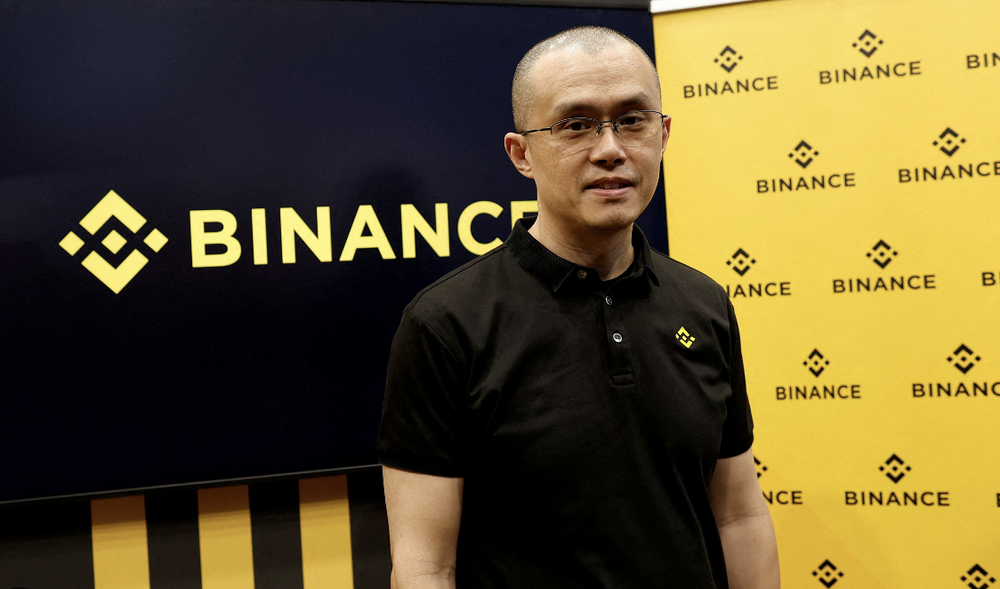Beixiong An, Nanfoshan: Blockchain Government Application C City Has Been Out | Blockchain Municipal Application
On July 6, Longhua District, Haikou City, Hainan Province launched Hainan's first blockchain + volunteer service project; on June 20th, Hangzhou Internet Court announced the launch of the first “5G+ blockchain” network implementation new model; June 13 On the same day, Guangzhou’s “Smart Bankruptcy Trial System” was launched, which included the nation’s first bankruptcy trial blockchain collaboration platform; on June 7, Chongqing enterprises using blockchain and face recognition technology launched an online service platform. Officially launched online…
Government affairs have become the main scene for the application of blockchain.
- Morning market: BTC continues to decline trend, mainstream currency still needs to find the bottom
- Bitcoin's scheduled chip for TSMC may provide 33 million TH/s of computing power in the second quarter of next year.
- US Senator: Facebook is very dangerous. Libra is not worthy of our trust.
According to the Inter-Chain Pulse Research Institute, in the first half of 2019, the number of blockchain government applications accounted for 20.3% of the total blockchain application. In the second quarter of 2019, the number of blockchain government applications increased by 59.3% compared with the first quarter.
This data is the result of the efforts of many provinces and cities in China to promote the development of blockchain government applications.
All provinces and cities are exerting strength in the field of blockchain government affairs, but which provinces and cities are the fastest?
The Mutual Chain Pulse Research Institute has a total of 71 blockchain government applications in 33 provinces and cities nationwide, and has opened the “creation 101” in the blockchain government affairs field. According to the number of government applications in each province and city blockchain, the inter-chain pulse divides it into four development echelons.
Among them, Xiong'an and Foshan are tied for C.
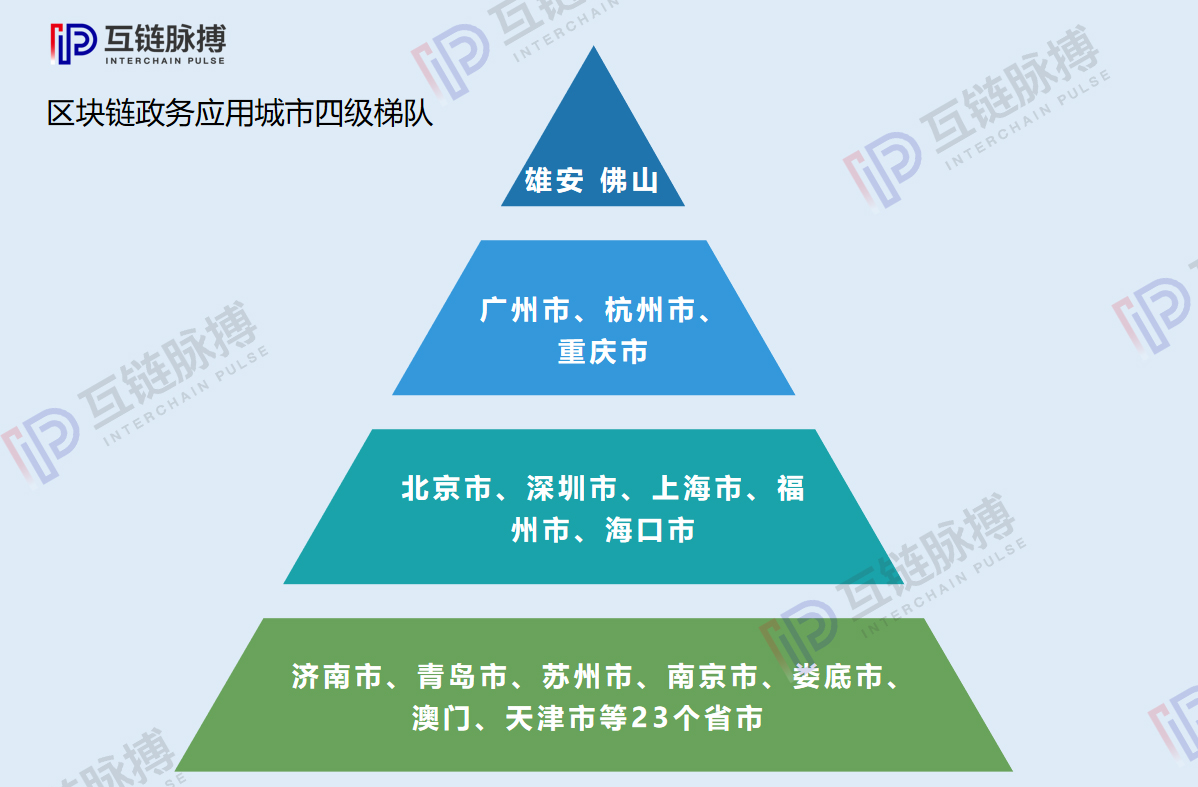
The first echelon: Xiong'an push incentive mechanism Foshan heavy data sharing
According to the incomplete statistics of the inter-chain pulse, there are 9 blockchain government applications in Foshan City, Guangdong Province and Xiong'an New District of Hebei Province, respectively, and they are ranked as the first development team of blockchain government.
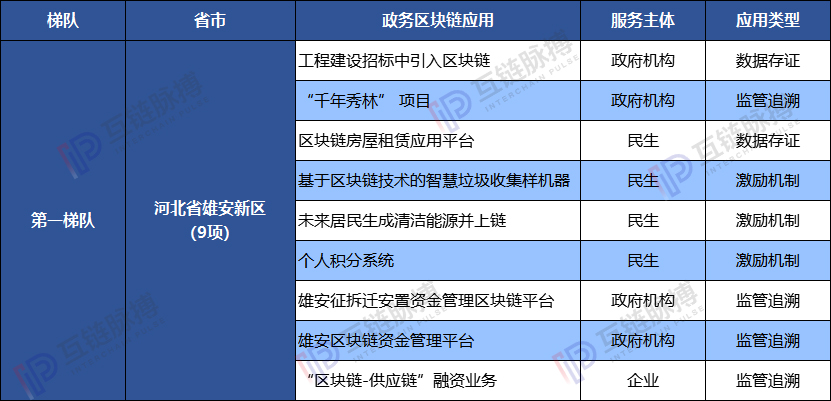
As a new city, Xiong'an is regarded as an important infrastructure from the beginning of urban construction. Therefore, its blockchain layout has also formed a relatively complete system, from fund management to project management and control, from land to house leasing, all links have blockchain technology intervention.
Mutual chain pulse statistics, since the end of 2017, Xiong'an has launched and landed 9 blockchain applications around the government sector. It is worth noting that, unlike other provinces and cities, there are three government applications that use the incentive characteristics of blockchain technology.
Xiong'an Future Personal Credit System will be implemented in a blockchain manner to reward the good performance of the market.
The resulting project is a smart garbage collector based on blockchain technology. The public can download the APP and dump the garbage after scanning the code. The built-in system of the garbage can give the garbage deliverer points reward according to the type and weight of the garbage. All the points can be exchanged for life through the service system in the new district in the future. Supplies, etc.
In addition to incentives, Xiong'an's main application type is regulatory traceability, which is relatively focused on the supervision and tracking of financial flows during project construction.
The most representative is the blockchain fund management platform of Xiong'an District. Xiong'an relies on this platform to realize the transparent management of financing, fund control and wage payment for several construction projects. The Yuerong Park Project, the New District Public Welfare Cemetery and Funeral Parlour Project, the Xiaoyi River Estuary Wetland Water Purification Project, the Waste Comprehensive Treatment Facility Phase I Project, and the South Juma River Flood Control Project are all carried out through the blockchain fund management platform. The entire process of fund management.
The “Millennium Xiulin” project also uses blockchain technology to extend the payment chain for afforestation funds to the end of payment. The payment for engineering and labor services is completed on the chain, and the financial transfer is regulated and necessary. Tracking; applying blockchain technology in the “Xiong'an Demolition and Resettlement Fund Management Blockchain Platform” to realize the whole process chain management of the original demolition and relocation and capital transvestment; China Communications International Airport The “blockchain-supply chain” subcontractor financing business of the first phase of the interception flood channel in Chengrong East Area is also the use of blockchain technology for regulatory traceability.
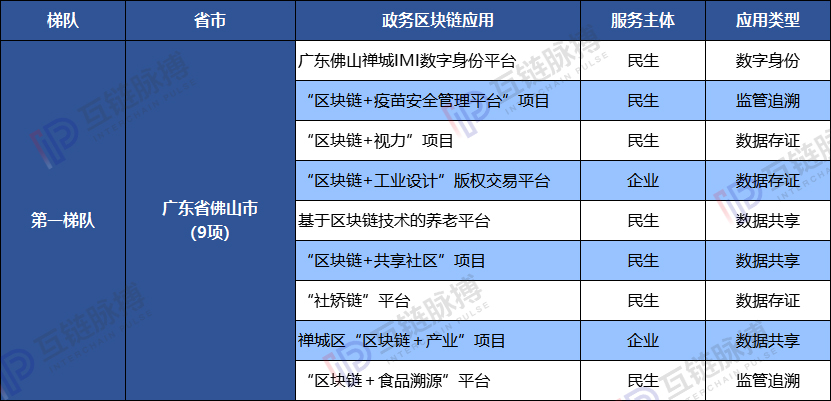
The number of government applications in the blockchain of Foshan City, Guangdong Province is the same as that of Xiong'an. As the first county in the country to explore the application of blockchain government, Chancheng relies on the support policies and talent resources of Guangdong Province to lead and promote the development of government chain applications in Foshan.
Inter-chain pulse observation, Foshan's government applications are more concentrated in the field of people's livelihood, the specific application is widely distributed in the medical, food, industrial and other industries. Among the nine applications of inter-chain pulse statistics, there are early landings and relatively mature scales; there are also trial operation projects that have just been launched recently.
Among them, the IMI digital identity platform was launched in June 2017, and currently has more than 1.3 million users. The platform is a smart multi-functional identity authentication platform built on the underlying technology of the blockchain. The public can conduct business such as provident fund inquiry, traffic violation inquiry, and water and gas gas fee inquiry through the platform. Pangu Health Platform, Yunwutong and other people's livelihood service platforms are also combined with this platform.
The “blockchain+food traceability” platform in Chancheng District was initially completed at the end of June this year. It is reported that the next step will be to select the students' most concerned catering course, and use the relatively closed-loop management of pork as a trace source to carry out project trial operation.
Inter-chain pulse analysis, the above two applications belong to the field of digital identity, regulatory traceability, and Foshan's blockchain government projects are relatively more focused on data sharing.
In the “blockchain pension service” project, blockchain technology builds a data sharing and linkage platform to improve the service management mechanism and apply it to “home-to-home service” and “life support” services to accurately match old-age services. demand.
In the “blockchain+shared community” project, the blockchain technology publishes the resources that residents can share and the required service information on the platform, further realizing the intelligent docking of “requirements list” and “service list”.
Chancheng District's “blockchain+industry” project can be applied within the enterprise to help enterprises improve internal operational efficiency and reduce communication costs through interactive information chaining.
The second echelon: Guangzhou, Hangzhou, Chongqing promote blockchain service government agencies
The second echelon has three cities in Guangzhou, Guangdong, Hangzhou, Zhejiang, and Chongqing. The number of blockchain administrations is six. In these three cities, Guangzhou and Hangzhou started to lay out the blockchain field earlier, and there is a corresponding blockchain support policy. In recent years, Chongqing Municipality has vigorously promoted the application of blockchain. In November 2018, Chongqing took the lead in innovating the application of blockchain government at the provincial level.
Mutual chain pulse observation, the second echelon city application service is mostly government agencies, accounting for 55.5% of the total number of entities such as enterprises and the public; the application types are mostly data storage, followed by data sharing.
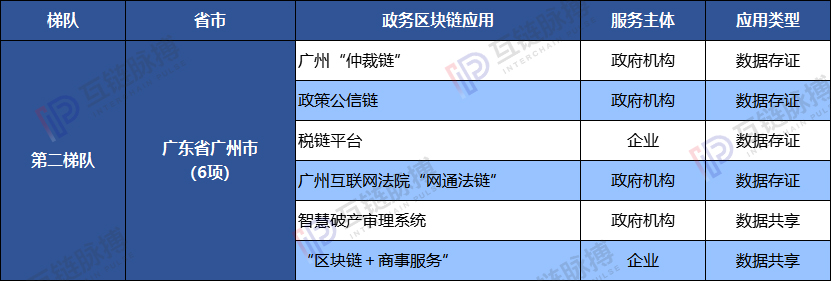
Most of the six blockchain government applications in Guangzhou, Guangdong Province have been well known to the public, such as the “arbitration chain” and “tax chain” platform in Guangzhou, and the “netcom law chain” of the Guangzhou Internet Court. In addition to these items, Guangdong Province has also recently tried to introduce more blockchain government applications.
In February 2019, the "Guangzhou Deepening Commercial System Reform Implementation Plan" was officially issued. In promoting the deep-level reform of commercial registration, the “Program” clearly needs to innovate the business registration model, pilot “blockchain + commercial services” in Huangpu District, and explore the creation of a shared registration model.
In June 2019, Guangzhou launched the "Smart Bankruptcy Trial System" system. Based on the national bankruptcy network, the system has realized “four first innovations”: the country’s first local administrator intelligent service platform, the country’s first local bankruptcy trial dynamic supervision platform, the country’s first creditor evaluation and supervision platform, and the nation’s first bankruptcy. Trial blockchain collaborative platform.
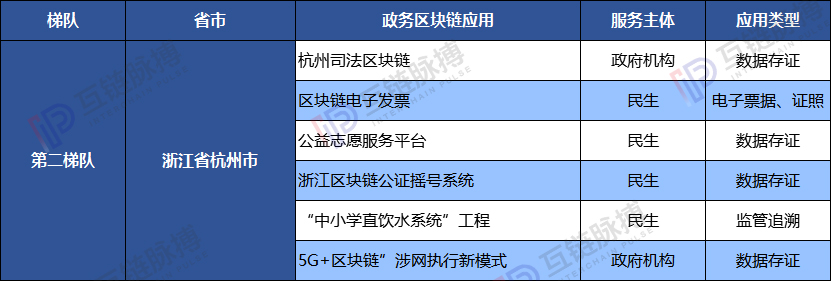
Like Guangzhou City in Guangdong Province, Hangzhou City, Zhejiang Province, has also launched the Hangzhou Judicial Blockchain project based on its own policies and the advantages of the Internet industry. In the first half of this year, Hangzhou City, Zhejiang Province has successively launched three blockchain government projects: In March 2019, Hangzhou Metro Union Alipay launched electronic invoices based on blockchain technology; in April, Zhejiang blockchain notarization system On-line testing, and officially started operations in May; in June, Hangzhou Internet Court launched a new model of "5G + blockchain" involving the network.
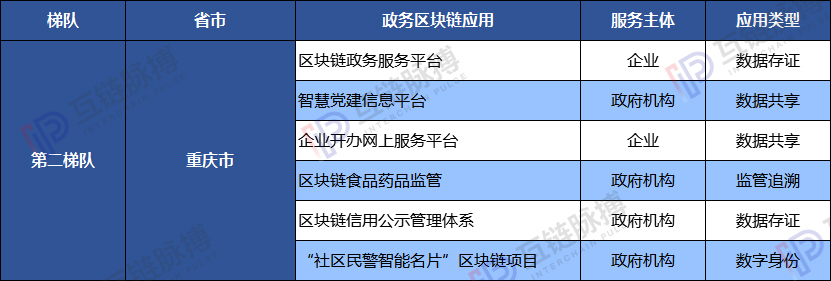
In November 2018, Chongqing took the lead in innovating the application of blockchain government at the provincial level. Around this time, Chongqing City has gradually promoted the implementation of blockchain government affairs.
In June 2018, Yuzhong District of Chongqing launched the information platform for the establishment of the Wisdom Party. In August of the same year, the “blockchain” model was adopted to establish the management system for the main quality credit of trading ports. In January 2019, the use of blockchain technology for food and medicine Regulatory tracing; in June 2019, Chongqing enterprises using blockchain construction launched an online service platform; in June, Chongqing’s blockchain government service platform in cooperation with Alipay was launched.
Among them, the earliest landing was the “Community Police Smart Card” blockchain project launched in February 2018. The project belongs to the field of digital identity, but unlike the usual digital identity authentication for the public, the project carries out digital identity authentication for community police and resident police. Based on the blockchain-based three-level identity verification system, the police wear a smart police contact card with a two-dimensional code of the security ID card.
The north echelon ranks the third echelon blockchain government to accelerate development
The city of the third echelon is slightly unexpected. There are 5 cities in Beijing, Shenzhen, Shanghai, Fuzhou and Haikou. The number of applications in each city's administrative blockchain is 2 or 3.
According to the statistics of inter-chain pulse, the application of blockchain technology in Beijing, Shenzhen and Shanghai is not as much as imagined.
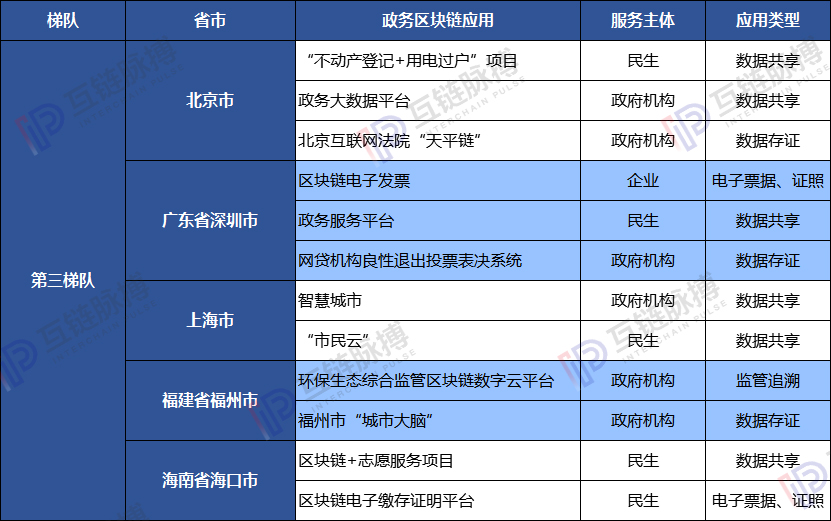
There are three applications for the Beijing blockchain government, the “balance chain” of the Beijing Internet Court and the two projects launched and landed this year.
In April 2019, Haidian District took the lead in launching the “Real Estate Registration + Electricity Transfer” project in the city, and fully promoted the application of blockchain technology in the registration scenario. In May, the data of the Municipal Public Security Bureau and the Civil Affairs Bureau was completed, and the blockchain technology officially launched external services in the Beijing stock market transaction scenario.
In April 2019, the Beijing Development Zone conducted a public tender for the government affairs big data platform project based on the blockchain development zone. In June news, the platform will be officially put into use before the end of the year. The platform will be based on the asymmetric encryption features of data sharing switching platform products and blockchain technology, and integrate cloud, network, number, chain, and intelligence related technologies to build a "smart chain overpass."
Shenzhen also has three blockchain government applications, which are also well-known blockchain electronic invoicing projects, as well as two application projects launched early this year and mid-year.
In January 2019, Shenzhen City launched the city's unified government service APP – "i Shenzhen", using blockchain technology to create a blockchain electronic card certification platform; followed by June, Shenzhen region launched the nationwide P2P The online lending institution has gracefully withdrawn from the unified voting system, and the system has introduced blockchain technology.
Compared with Beijing and Shenzhen, Shanghai has fewer applications in the blockchain government sector, with a total of two. First, in March 2019, Shanghai Yangpu District Science and Technology Committee promoted the construction of smart cities. Yangpu District actively explored the Internet of Things blockchain technology in accordance with the strategic deployment of “Building a New Smart City Pilot Zone”. Second, in April 2019, Shanghai “Citizen Cloud” users exceeded 10 million, and Shanghai began to explore the use of blockchain thinking to solve public service problems.
There are also two blockchain government applications in Fuzhou City, Fujian Province and Haikou City, Hainan Province.
In January 2019, Fuzhou City, Fujian Province cooperated with Bittland to use the blockchain technology to jointly create the “urban brain” of Fuzhou; in May 2019, Yongtai County of Fuzhou passed the construction of an environmentally-friendly ecological comprehensive supervision blockchain elastic digital cloud platform. It has realized the use of information technology to help comprehensive ecological management.
In 2018, Hainan Province launched the first blockchain electronic deposit proof platform in the country; in July 2019, Longhua District, Haikou City, Hainan Province launched Hainan's first blockchain + volunteer service project, namely through the establishment of the District Party Committee Propaganda Department. The cohesive mechanism of the Youth League, civil affairs, and judicial departments and volunteer service work will be interconnected on the volunteer service platform.
The fourth echelon: application landing is concentrated in 2018
There are 23 provinces and cities in the fourth echelon, which respectively launched a blockchain government application, and the inter-chain pulse observation of these 23 applications, the field of landing is more scattered. Among them, there are 6 blockchain government applications in the cities under the jurisdiction of Shandong Province. There are 5 blockchain government applications in the cities under the jurisdiction of Jiangsu Province. However, the dominant cities in each application are not concentrated, so Shandong and Jiangsu rank first. Four echelons.
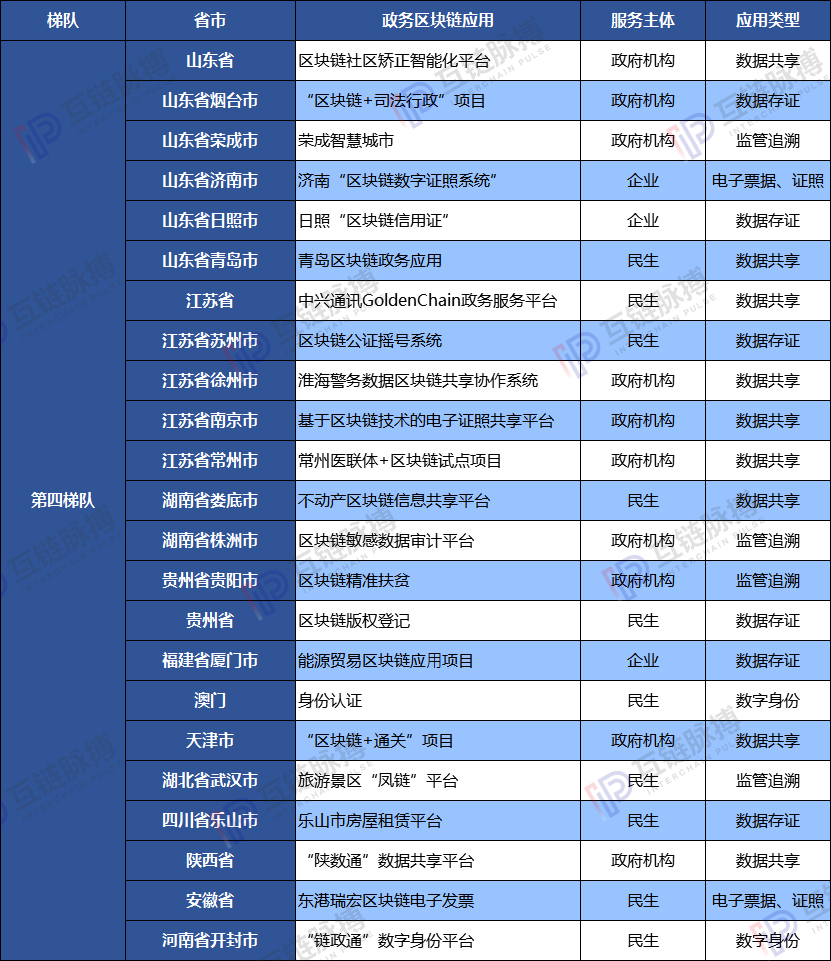
The application of blockchain government affairs in Shandong Province was concentrated in 2018. Jinan City, Qingdao City, Rongcheng City, Rizhao City and Yantai City successively launched blockchain government applications in 2018.
In May 2018, Qingdao North District began to explore the application of blockchain in government affairs. Specifically, it is to “go up the chain” of the government business and realize the “zero errands” and “paperless” handling of the citizens.
In June of the same year, Jinan City proposed to deepen the reform of “one-time implementation”. The “Enterprise Start-up” system was successfully launched, and the first digital business license for storage and transmission in the blockchain in Shandong Province was born; the first blockchain credit in Shandong Province was opened in Rizhao; Yantai City, Shandong Province explored The realization form of “blockchain+judicial administration” promotes the application of “blockchain” technology in the field of judicial administration such as community correction, notarization and judicial appraisal.
In September, the Rongcheng Municipal Government of Shandong Province cooperated with enterprises to create a blockchain smart city platform, which is widely used in many projects and components of Rongcheng Smart City.
The applications of Sichuan Province, Shaanxi Province, Anhui Province, Henan Province, and Hubei Province all landed in 2018.
In April 2018, through “Shaanxi Digital Communication”, Xianyang, Shaanxi Province, will be in the 85 categories of data involved in more than 1,300 units of the three levels of public security, civil affairs, social security, hospitals, banks, etc.; Kaifeng City, July 2018 Lancao County landed “Chain Zhengtong”, providing blockchain digital identity for 850,000 residents in Lankao County; also in July, Anhui Province’s Donggang Ruihong blockchain electronic invoice project landed; in October, Leshan City Leasing The platform is running online.
The blockchain government project in Jiangsu Province was launched earlier. In August 2017, Changzhou City and Ali Health Cooperative Medical Link + Blockchain pilot project. Since then, related applications have been launched in the field of police and electronic licenses.
In March 2019, Jiangsu Province introduced a blockchain notarization system. The system is not only earlier than the Yaohao system in Zhejiang Province. It is reported that the use of blockchain notarization and lottery system for on-site lottery and live broadcast is also the first time in the country.
In addition, there are two places in Loudi City and Zhuzhou City in Hunan Province to launch blockchain government applications.
In November 2018, Loudi City real estate blockchain information sharing platform was officially launched. This platform is the first blockchain project built by Loudi in the field of government service; Zhuzhou City is jointly developed by Bitstream to develop a blockchain sensitive data auditing platform, using blockchain technology to record sensitive data operations, and can Trace the operation history.
The application of Macao and Tianjin is achieved this year.
In February 2019, the Macau Science and Technology Development Fund established by the Macau government signed a cooperation agreement with Weizhong Bank. The first project of cooperation between the two parties will be based on the “WeIdentity” entity identity authentication and trusted data exchange solution.
In April 2019, the Tianjin Port Block Chain Verification Pilot Project was put into trial operation, and for the first time in the country, the deep integration of transaction, finance, logistics, and supervision in blockchain technology and cross-border trade was realized.
Blockchain Government Application: Data Deposit and Sharing Requirements
While counting the number of government applications in blockchains in various provinces and cities, the inter-chain pulse has analyzed the above 71 applications from the perspective of the main features of the application service and the technical characteristics of the blockchain used by the application.
Inter-Chain Pulse divides application service entities into government agencies, businesses, and the public. From the statistical data, the blockchain government applications serving government agencies and serving people's livelihood accounted for 42.2%, while the service enterprises accounted for 15.4%.
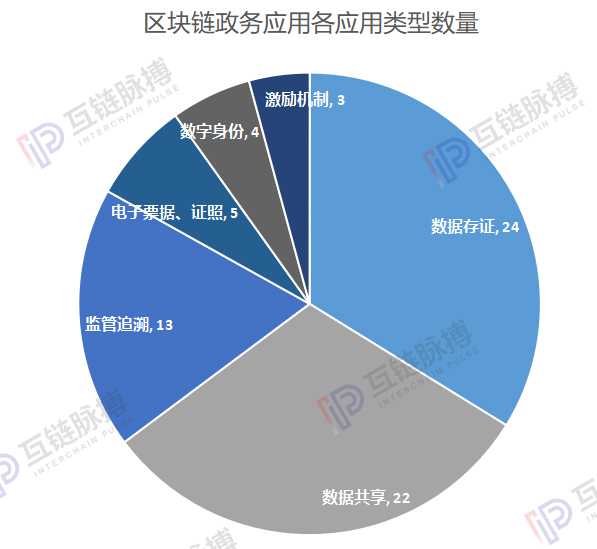
At the same time, the inter-chain pulse divides its application type from the characteristics of the blockchain used in government applications, which can be divided into: data deposit certificate; data sharing; regulatory traceability; electronic bills, licenses; digital identity; . Of the 71 applications, 33.8% belong to the data storage category; 30.9% belong to the data sharing category; 18.3% belong to the regulatory source. The needs of provinces and municipalities for the protection of government affairs information in the blockchain and the realization of government data sharing are relatively strong.
Not only the main body of the application service, but also the type of application, the fields in which statistics are applied are more extensive.
Among them, the more common areas are the judicial field, such as the “Tianping Chain” of the Beijing Internet Court, the Hangzhou Judicial Block Chain in Zhejiang Province, the “Netcom Law Chain” of the Guangzhou Internet Court, and the “Block Chain + Judicature of Yantai City, Shandong Province”. The “administration” project belongs to this field.
Recent emerging areas are lottery, police, community corrections and renting. Mutual chain pulse statistics, there are Zhejiang blockchain notarization system, and blockchain notarization system in Suzhou, Jiangsu; Chongqing “community police smart card” blockchain project in the police field, Jiangsu Huaihai Police Data Block Chain sharing and collaboration system; community correction is Foshan's “social chain” platform, Shandong province's blockchain community correction intelligent platform; rental housing area has Sichuan Leshan City housing rental platform, Xiong'an blockchain housing rental application platform .
Statistics on the application of blockchain administration in various provinces and cities:

Author: Mutual chain pulse King-propelled vehicle
This article is [inter-chain pulse] original, reproduced please indicate the source!
We will continue to update Blocking; if you have any questions or suggestions, please contact us!
Was this article helpful?
93 out of 132 found this helpful
Related articles
- Libra VS US Congress New Currency War
- Questions that David Marcus avoided at the hearings
- Libra hearings are full of gunpowder: it is difficult for regulators to trust Facebook
- Senior Republican Party: Centralized companies have data leakage risks, blockchain is the best alternative to privacy protection
- Quotes Daily: BTC fell below the $10,000 mark, and the short-selling force gradually fermented
- Facebook hearings 丨 yesterday, today, Libra's road to tomorrow is even harder
- Six pictures analyze the status quo of stable coins





